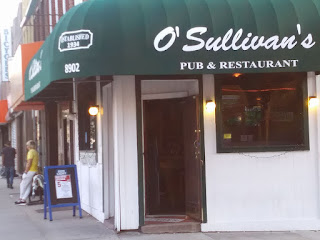The Hollow Heart
We’ve been watching a British detective series on PBS called “Ridely” for two seasons now.
It’s a decent show starring Adrian Dunbar as a retired cop who is lured back into service as a consultant.I’ve seen better, frankly, but it’s well done, and Dunbar is backed up by a fine cast and likeable characters.
My biggest beef with the program is that our hero is part owner of a jazz bar and every so often—far too often if you ask me—he takes to the stage to sing.
The songs, for the most post, are painfully bad, especially one number called “Open Up Your Door,” which had me jumping out my window.
In addition, Dunbar singing’s voice is, let’s say…subpar, and what the hell does singing in a jazz club have to do with solving crimes?
We all have our hobbies and side hustles, but this plotline seems arbitrary, and it is by the far the weakest aspect of the series. If the writers ever decide to jettison the singing angle, they’ll get no complaint from me.
The last episode, however, made some good use of the jazz club setting. Ridley, whose wife and daughter had been murdered, has feelings for the woman who co-owns the place.
However, another guy comes along, and it looks like the two are hitting it off, leaving Ridley alone again naturally. (Please don’t sing that one, Ridley.)
The show ends with Ridley on stage performing “Try to Rember” from the long-running off-Broadway play The Fantasticks.
This is such a lovely song, which Dunbar manages not to mangle too badly, and it contains these touching lines:
“Deep in December, it’s nice to remember,
Although you know the snow will follow,
Deep in December, it's nice to remember:
Without a hurt the heart is hollow”
'I Need My Pain'
That line about the heart being hollow tells us that pain is a part of life and that the hardships we experience make us value what we have and help us grow.
In this case, Ridley must accept that he has lost his chance with this woman. (At least for now.)
Obviously, nobody wants to be hurt, but unless you live in an underground bunker and have no human contact whatsoever, you’re going to have some heartache in your life.And isolating yourself will only create the pain of loneliness and regret.
The Fantasticks opened in 1960 and ran for a total of 42 years and 17,162 performances, making it the world's longest-running musical. The show closed in 2002 but was revived in 2006 and ran 11 more years, and I still managed to miss it.
But at least I know this wonderful song and those haunting lyrics. The late Jerry Orbach—best known to many as Lennie Briscoe in Law & Order--was in the original production and sang “Try to Remember” so beautifully that I don’t want to hear anybody else do it.
Now I’m going to take a bit of leap here and beam over to Star Trek, specifically Star Trek 5: The Final Frontier.
The 1989 film was the reportedly nearly killed the franchise and, yes, it does have its problems, but it also has a fascinating concept where a renegade Vulcan creates a cult following by using his abilities to heal a person’s innermost pain through the Vulcan mind meld.
Kirk refuses to go along with the plan, however, because he knows what this guy is pedaling is unnatural.
“Damn it, Bones, you're a doctor,” he tells McCoy. “You know that pain and guilt can't be taken away with a wave of a magic wand. They're the things we carry with us, the things that make us who we are. If we lose them, we lose ourselves. I don't want my pain taken away. I need my pain.”
And 2002’s Eternal Sunshine of the Spotless Mind tells the story of a couple that undergoes a medical procedure to have each other erased from their memories forever after their relationship goes south.
I was going through a particularly rotten period in my life at this time and the idea of erasing the memory of a failed relationship from my brain seemed awfully appealing.
And it’s also unnatural. Life does not work this way, there’s ain't no free lunch, and a hollow heart has nothing to offer but an echo.
But we don’t all have to sing about it.





Comments
Yeah, there are a lot of emotionally scarred detectives around, aren't there? Haven't seen Monk yet, but I hear good things.
Take care!
And the season finale number was atrocious. I give the extras in the bar scenes all the credit in the world for pretending to enjoy themselves.
I like Van der Valk as well, despite the accent anomaly. There was an earlier version of the show in the Seventies--also English--that you can find on YouTube.